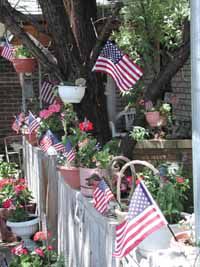| Old Glory serves as a symbol of patriotism not only on Flag Day, but also during the July 4th holiday season. Due to extreme drought conditions, Carbon County residents should exercise caution when celebrating the holiday with fireworks. |
With the approaching July 4th and July 24th holidays, Carbon residents are finding fireworks readily accessible. Stands are popping up across the county and store are stocking shelves with the potentially dangerous objects.
Because of the extremely dry conditions, residents are urged to use caution while dealing with the explosives. A stray firework could set a hillside ablaze, not to mention injuries may also be sustained by consumers igniting the devices.
In Utah, firework sales are prohibited between June 20 and July 24. The permitted fireworks cannot be lit or discharged legally until July 1.
Specific bans have not been announced in the Carbon County area, but residents should respect the dangers compounded by severe drought conditions and steadily worsening fire hazards.
Despite no specific firework bans, several federal restrictions do apply. Prohibited explosive devices include M-80s, M-100s, blockbusters, cherry bombs, reloadable shells, larger firecrackers containing more than two grams of powder and mail-order kits designed to be assembled by the consumer.
The explosives have been banned across the United States since 1966 under the Federal Hazardous Substances Act.
Often times, legally prohibited fireworks are available to the public. To ensure that the unlawful explosives are not used, consumers are encouraged to check for labels on all fireworks.
Labels should clearly name the item along with the manufacturer and list instructions for proper use.
Carbon residents should not purchase or use unlabeled fireworks. Not only are the devices illegal, but the fireworks are also extremely dangerous.
If a seller is suspected of distributing illegal fireworks, local law enforcement should be contacted.
Even legal fireworks should be used only with extreme caution. A federal regulation requires that any firework should have a fuse which burns at least three seconds, but no longer than nine seconds.
The U.S. Consumer Product Safety Commission also warns users that fireworks are not toys. In fact, the primary function of a firework is to produce motion and visible or audible effects. The devices do so by burning. The approximate burn temperature is equal to that of a lit household match and can cause burn injuries and ignite clothing if used improperly. Therefore, never allow young children to use fireworks. Even sparklers can be unsafe if used improperly. Adult supervision is mandatory.
When using fireworks, the U.S. Consumer Product Safety Commission suggests the following tips to ensure that no injuries occur.
•Buy only state-sanctioned fireworks that have class C printed on the labels.
Bottle rockets, firecrackers and Roman candles account for most fireworks related injuries and are illegal in Utah.
•Never experiment with fireworks.
•Only light one firework at a time.
•Never give fireworks to children.
Sparklers burn at 2,000 degrees Fahrenheit, a temperature hot enough to melt gold.
Sparklers cause three-fourths of all firework injuries to children.
•Keep a bucket of water or a garden hose handy.
After about 15 to 20 minutes, place the firework in a bucket of water and allow it to soak for several hours before disposing of the device in the trash can.
•Never relight fireworks that have not fully functioned. If the firework does not light the first time, a malfunction has occurred. Don’t risk having the firework explode in while holding the device. The explosive power of a firework could easily remove fingers.
•Only light fireworks on a smooth, flat surface away from a home or an area filled with vegetation.
Never use a metal or glass container. A metal container can result in the same effect as a bullet being fired and a glass container can explode, scattering glass shrapnel to spread.
•When using the fireworks outside, make sure to avoid setting up the display near buildings, flammable materials or dry vegetation.
By practicing the precautionary measures, residents will reduce the potential risk for injuries and wildfires.

